By B Izzak
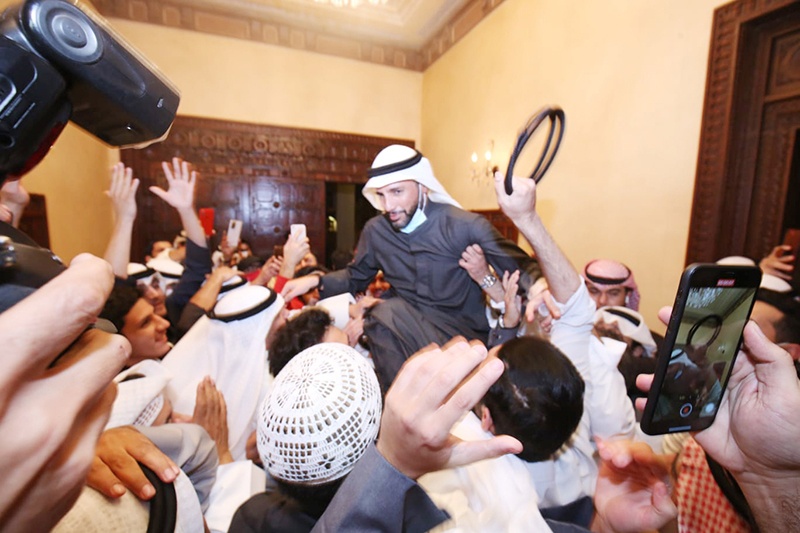
KUWAIT: Marzouq Al-Ghanem celebrates with his supporters in Abdullah Al-Salem after his victory in the National Assembly elections early today. - Photos by Yasser Al-Zayyat 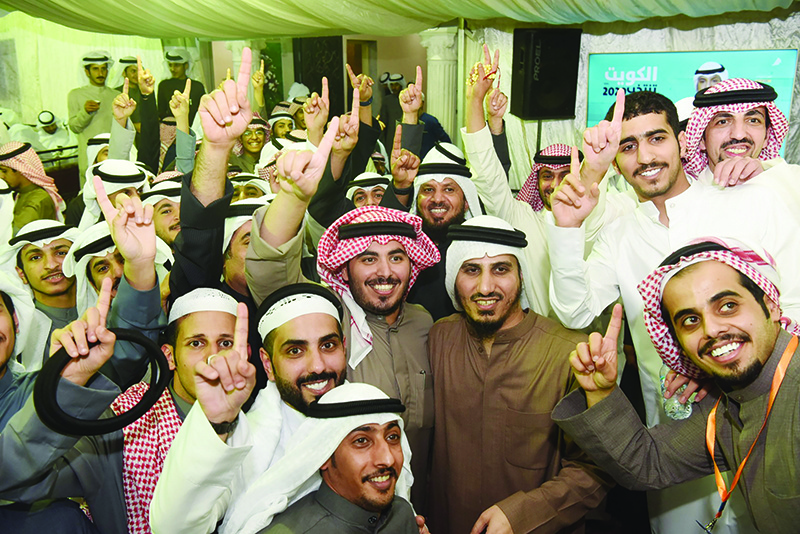
Badr Al-Dahoum celebrates his election win with supporters in Jaber Al-Ali early today. 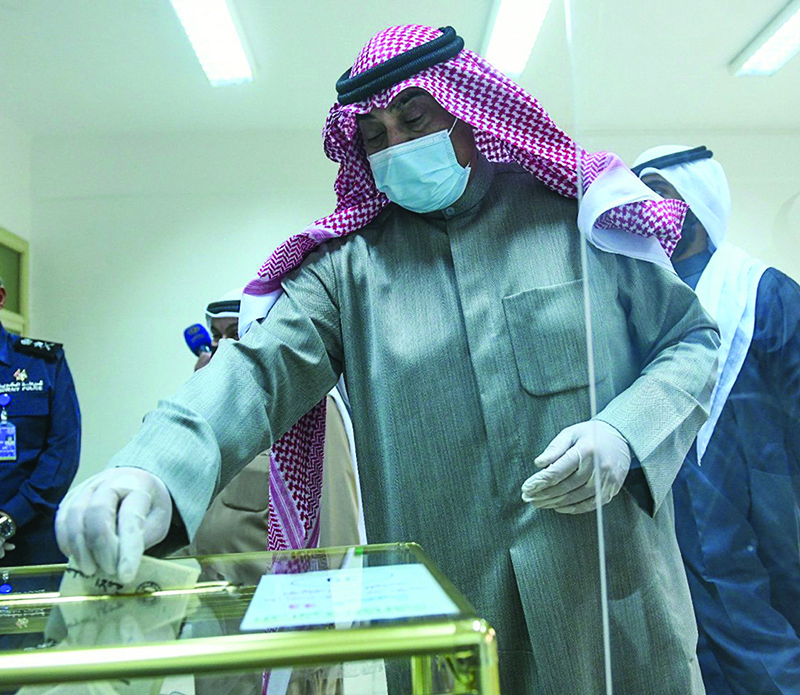
HH the Prime Minister Sheikh Sabah Al-Khaled Al-Hamad Al-Sabah votes at a polling station in Jabriya yesterday.
KUWAIT: Kuwaiti voters defied rain and coronavirus measures and turned out in large numbers yesterday to vote for a big change, reelecting only 18 of the 50 members of the outgoing National Assembly in what appears to be the result of frustration over a lack of performance, according to early results. Turnout was close to 70 percent and exceeded 80 percent in some centers as Kuwaiti male and female voters waited for a long time under scattered rain throughout the day.
It was a sweeping change across the board and in all the five constituencies, as a number of prominent veteran MPs failed to get reelected. They included Adel Al-Damkhi and Saleh Ashour in the first constituency, Riyadh Al-Adasani and Omar Al-Tabtabaei in the second, and Safa Al-Hashem, Ahmad Al-Fadhl, Khalil Abul and Mohammad Al-Jabri in the third constituency, along with Abdulwahab Al-Babtain.
In the fourth constituency, the biggest upset was the failure of MP Mohammad Hayef to be among the top 10 winners in the fourth constituency. Others in the district who failed to make a comeback include MPs Ali Al-Deqbasi and Faraj Al-Arbeed. In the fifth constituency, MP Al-Humaidi Al-Subaei was not among the 10 winners, along with MP Faisal Al-Kandari.
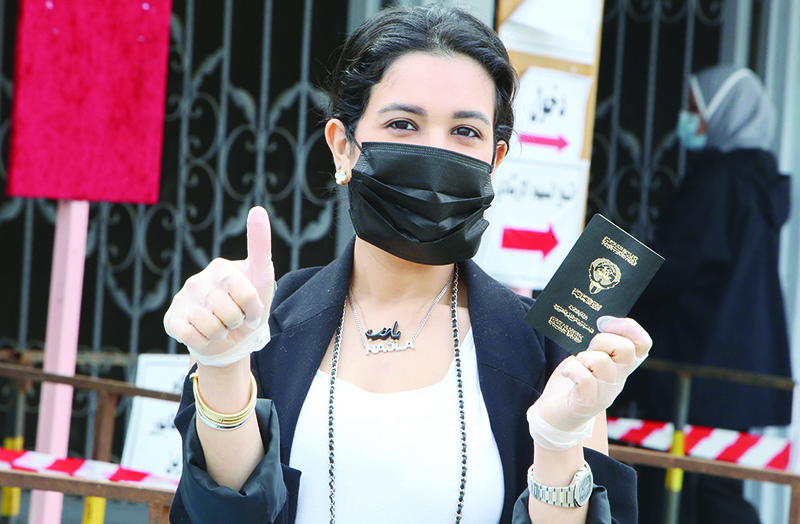
A woman reacts as she arrives to cast her vote at a polling station in Abdullah Al-Salem yesterday. 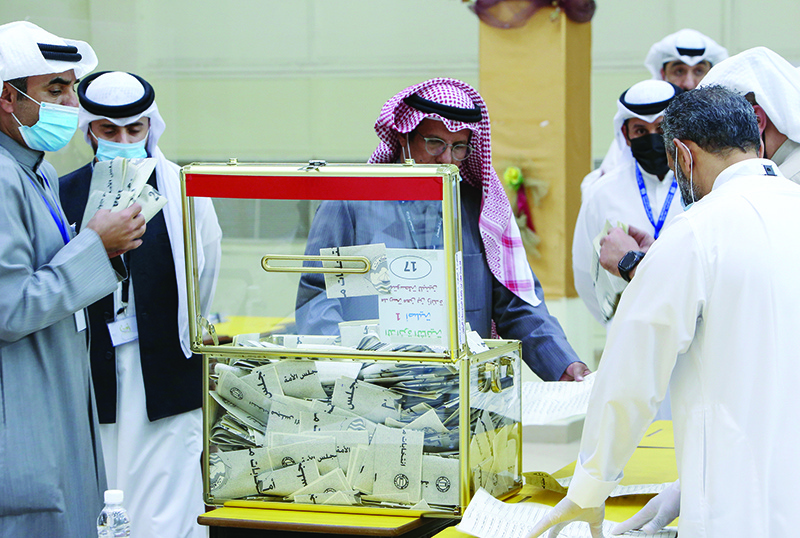
A judge and his aides count ballots at a polling station yesterday. 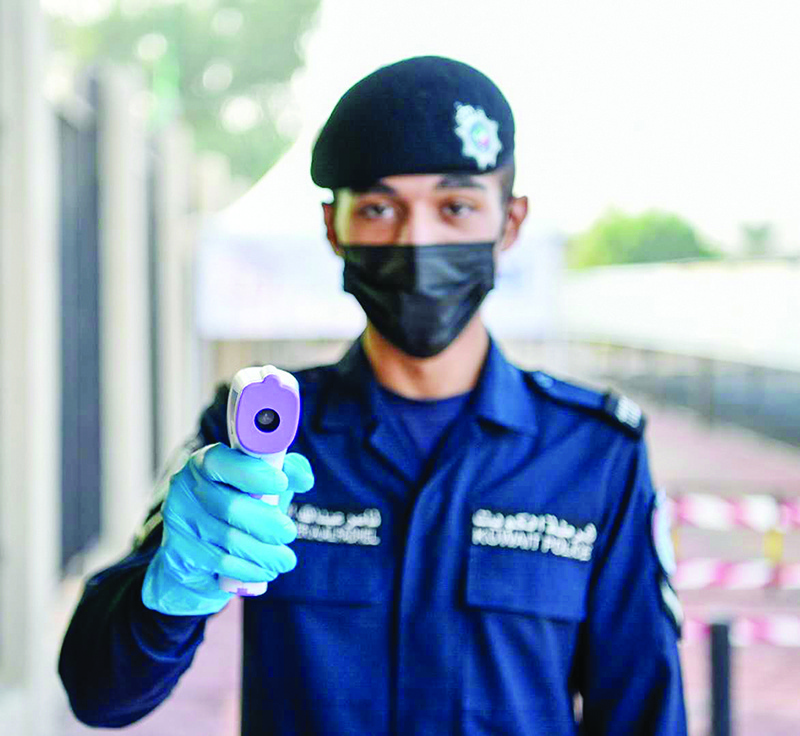
Strict health precautionary measures were in place during the elections amid the coronavirus pandemic.
According to unofficial results which could change, at least 14 pro-government lawmakers failed to get re-elected in all the five constituencies. At the same time, at least seven opposition figures also failed to retain their seats. The Islamic Constitutional Movement (ICM), the political arm of the Muslim Brotherhood, appeared headed to maintain its strength of four MPs, and its supporters were also in a strong position.
The two candidates fielded by pro-government Salafists were losing, while Salafists in the opposition appeared to be winning at least three seats, the same strength in the outgoing Assembly. Two former ministers - Roudhan Al-Roudhan and Jabri - were not among the top 10, while another former minister Badr Al-Humaidi was in a strong position.
Speaker of the outgoing Assembly Marzouq Al-Ghanem retained his seat in a remarkable fashion, occupying the first position with a big margin. Two opposition figures who had boycotted elections in the past eight years also won impressively. Hassan Jowhar and Badr Al-Dahoum won the first place in the first and fifth constituencies respectively. The opposition, formed mainly of Islamists, appears headed to win around 20 seats, and is expected to have a few more supporters. At least 10 Islamists are certain to have seats in the Assembly. Final results are expected later today.
Earlier yesterday, authorities set up security barriers around the country’s 102 polling stations to prevent gatherings, with designated lanes for entry and exit. Mask-clad voters, who were also forced to wear gloves, were subject to temperature checks before entering the facilities where election officials stood behind glass barriers. In an effort to respect their right to vote, authorities had designated five polling stations - one in each electoral district - for coronavirus patients and those in quarantine to cast their ballots. The polls opened at 8:00 am and closed at 8:00 pm.
With more than 144,000 novel coronavirus cases to date, including 889 deaths, the election campaign was toned down, with only a few banners hoisted over the streets. Instead, this year’s campaign was mainly fought on social networks and in the media. Yet the normal themes remained: Promises to fight corruption and address youth employment, along with debates over freedom of expression, housing, education and the thorny issue of the stateless “bedoon” minority.
“We want change, new blood, to encourage the youth,” said Hoda Al-Hassan, who cast her ballot in Rawda. “I also hope that the parliament will resolve the issue of the bedoons and that of the demographic imbalance,” she added. Yousef Ahmed Safar, who voted in Nuzha, said he too hoped for reform. “We want to improve our situation, including in employment and housing, as well as the issue of combatting corruption,” he said. More than 567,000 Kuwaiti voters were eligible to choose among the 326 candidates, who included 29 women.
HH the Prime Minister Sheikh Sabah Khaled Al-Sabah told reporters during a tour of the polling stations that he was “happy” with voter turnout and health measures, urging people against gathering to celebrate. Waiting areas with chairs placed at least two meters apart were set up last-minute in the playgrounds of some schools serving as polling stations, the interior ministry said.
According to health ministry spokesman Abdullah Al-Sanad, two people were transported to hospital during polling, reported the official Kuwait News Agency. He said a number of people were treated for fatigue, headaches or drop in sugar levels at clinics set up in the polling stations.
Like most Gulf countries, Kuwait’s economy has been hit hard by the double whammy of the pandemic and slumping oil prices. “The people were not satisfied with the performance of the previous parliament, and there are many who are calling for a comprehensive reconciliation between the government and the opposition,” Kuwaiti analyst Mohammed Al-Dawsari said. Kuwait was the first Gulf Arab state to adopt a parliamentary system, in 1962. Women were granted the right to vote and to stand for election in 2005.










